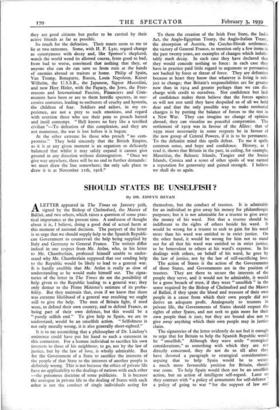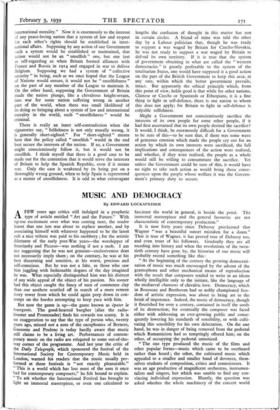SHOULD STATES BE UNSELFISH ?
By DR. EDWYN BEVAN
ALETTER appeared in The Times on January 3oth, signed by the Bishop of Chelmsford, the Master of Balliol, and two others, which raises a question of some prac- tical importance at the present time. A confusion of thought about it is, I believe, doing a good deal of actual harm at this moment of national decision. The purport of the letter is to urge that we should supply help to the Spanish Republi- can Government to countervail the help being supplied by Italy and Germany to General Franco. The writers differ indeed in one respect from Mr. Attlee, who, in his letter to Mr. Chamberlain, professed himself unable to under- stand why Mr. Chamberlain supposed that our sending help to the Republic would be likely to lead to a general war. It is hardly credible that Mr. Attlee is really as slow of understanding as he would make himself out. The signa- tories of the letter in The Times do see the, possibility of help given to the Republic leading to a general war; they only demur to the Prime Minister's estimate of its proba- bility. But they maintain that, even if we knew that there was extreme likelihood of a general war resulting we ought still to give the help. The men of Britain fight, if need were, to defend their own country, and to defend France, as being part of their own defence, but this would be a " purely selfish end." To give help to Spain, we are to understand, would be an unselfish action. " Selfishness is not only morally wrong, it is also generally short-sighted."
It is to me astonishing that a philosopher of Dr. Lindsay's eminence could have put his hand to such a statement in this connexion. For a human individual to sacrifice his own interests to those of his neighbour, to go, not by the law of justice, but by the law of love, is wholly admirable. But for the Government of a State to sacrifice the interests of the people of that State to the interests of another people is definitely wrong. This is not because the ethics of private life have no applicability to the dealings of nations with each other —the poisonous doctrine of some publicists. It is because the analogue in private life to the dealing of States with each other is not the conduct of single individuals acting for themselves, but the conduct of trustees. It is admirable for an individual to give away his money for philanthropic purposes; but it is not admirable for a trustee to give away the money of his ward. Not that a trustee should be indifferent to the rights of others beside his ward. It would be wrong for a trustee to seek to gain for his ward more than his ward was entitled to in strict justice. On the other hand, it would be wrong for him not to stand out for all that his ward was entitled to in strict justice, to be benevolent to others at his ward's expense. In his dealings with others, on behalf of his ward, he goes by the law of justice, not by the law of self-sacrificing love.
The action of States is the action of the Governments of those States, and Governments are in the position of trustees. They are there to secure the interests of the people they serve, and it would not be admirable, it would be a gross breach of trust, if they were " unselfish " in the sense required by the Bishop of Chelmsford and the Master of Balliol, if they spent the blood and treasure of their own people in a cause from which their own people did not derive an adequate profit. Analogously to trustees in private life, the Governments of States should respect the rights of other States, and not seek to gain more for their own people than is just; but they are bound also not to give away anything which their own people may in justice claim.
The signatories of the letter evidently do not feel it enough to urge that for Britain to help the Spanish Republic would be " unselfish." Although they wave aside " strategical considerations," as something with which they are not directly concerned, they do not do so till after they have devoted a paragraph to strategical considerations. arguing that to help Spain would be to secure a much more favourable position for Britain, should war come. To help Spain would then not be an unselfish action, but an action of intelligent self-regard. Later on they contrast with " a policy of armaments for self-defence " a policy of going to war " for the support of law and international morality." Now it is enormously to the interest of any peace-loving nation that a system of law and respect :or each other's rights should be established in inter- national affairs. Supposing by any action of our Government ,uch a system would be established or maintained, that action would not be an " unselfish " one, but one just as self-regarding as when Britain formed alliances with France and Russia in 1914 and engaged in war to deliver Belgium. Supposing we had a system of " collective security " in being, such as we once hoped that the League of Nations would ensure, it would not be " unselfishness " on the part of any member of the League to maintain it. On the other hand, supposing the Government of Britain made the nation plunge, like a chivalrous knight-errant, into war for some nation suffering wrong in another part of the world, when there was small likelihood of its doing so bringing about a system of law and international morality in the world, such " unselfishness " would be criminal.
There is really an inner self-contradiction when the signatories say, " Selfishness is not only morally wrong, it is generally short-sighted." For " short-sighted " means here that the policy called " unselfish " would in the end best secure the interests of the nation. If so, a Government might conscientiously follow it, but it would not be unselfish. I think myself that there is a good case to be made out for the contention that it would serve the interests of Britain to help the Spanish Republic, even if it means war. Only the case is weakened by its being put on a thoroughly wrong ground, when to help Spain is represented as a matter of unselfishness. It is odd to what extravagant lengths the confusion of thought in this matter has run in certain circles. A friend of mine was told the other day by a Labour politician that, though he was ready to support a war waged by Britain for Czecho-Slovakia, he was not ready to support a war waged by Britain to defend its own territory. If it is true that the system of government obtaining in what are called the " western democracies " is greatly preferable to the system of the totalitarian States, one would have supposed it a good action on the part of the British Government to keep this area, at any rate, within which the better government prevails, intact. But apparently the ethical principle which, from this point of view, holds good is that while for other nations, Chinese or Czechs or Spaniards or Ethiopians, it is a fine thing to fight in self-defence, there is one nation to whom this does not apply; for Britain to fight in self-defence is culpable selfishness.
Might a Government not conscientiously sacrifice the interests of its own people for some other people, if it had first ascertained that its own people desired the sacrifice? It would, I think, be enormously difficult for a Government to be sure of this—to be sure that, if there was some wave of generous emotion which made the people cry out for an action by which its own interests were sacrificed, the full implications and consequences of the action were realised, and whether, if they were realised, the people as a whole would still be willing to consummate the sacrifice. Yet unless the Government could be sure of this, it would have no right to take such action as would bring those conse- quences upon the people whose welfare it was the Govern- ment's primary duty to secure.











































 Previous page
Previous page